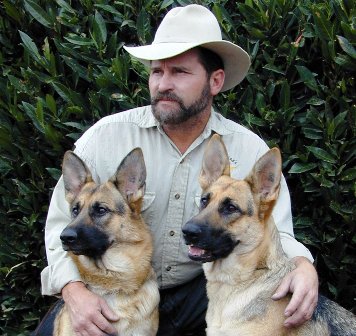Ken Schilling’s philosophy of dog handling is to develop compliance. Training both the dog and the owner is a large part of his curriculum, as a dog’s training is only as good as the environment in which it lives. While Ken does train dogs without the owners, he enjoys working with the owners as much as possible.
Ken uses what he calls Schilling’s Balanced Method, in which there is a balance of reward and discipline; a deliberate balance in training will gain compliance quickly and effectively, eliminating confusion and promoting comprehension. This “balance” defines GOOD (appropriate, acceptable) behavior as rewarding and BAD (inappropriate, unacceptable) behavior as having consequences which are not rewarding.
Balanced does not mean equal – done properly there is far more reward than discipline, the balance is achieved through the elimination of the opportunities to display BAD behavior.
Clear communication develops the understanding necessary for both the dog and owner to enjoy a rewarding relationship.
Ken is “As gentle as possible, as firm as necessary; designing each exercise for success.” Ken ensures that the dog receives praise and reward – which leads to a happy, compliant dog.
Ken Schilling on the “Alpha Roll” (I’ll take mine with coffee, black)

The “alpha roll” is touted as an act of domination in the canine world. I submit this interpretation is incorrect; it does not occur. The act of rolling over on one’s back is an act of voluntary submission performed by a weak-minded dog — not an act of dominance — and is the least likely option to be chosen. Generally, a dog’s reaction is either fight or flight. If “fight” is chosen, and the battle goes against them, the dog will then opt to flee, but not roll over and pee.
In training a truly dominant dog, a person should seek compliance rather than submissive behavior in the dog/handler relationship.
In training, I assume a dominant attitude; as gentle as possible, as firm as necessary. When first establishing rapport with a dog, the attitude — my attitude — is that of a MAN dealing with a dog (after all, I buy the groceries and pay the rent), not the dog to dog, “alpha” mind-set, which is confrontational and subject to challenge, fight or flight. As a trainer, I predetermine the outcome of training sessions and this is not subject to challenge, fight or flight. Compliance is mandatory and is rewarded; noncompliance simply is not an option which I offer. By eliminating options other than the correct one — through the design and structure of each exercise — the dog is successful, receives reward and learns compliance. Any other form of submissive behavior detracts from successful communication, comprehension and completion (roll-over-and-pee is really tough to deal with). Both fight and flight are powerful emotional, as well as physical, drives which severely inhibit the learning process.
Help yourself; help your dog; get some training; but get your “roll” at the bakery.
Untrainable?
When asked if a dog is ever “untrainable”, or if certain breeds are better than others, Ken likes to use the following analogy: Take a pigs ear, give it to a master leatherworker, and you can end up with a nice useful leather product like a wallet. But you cannot make a silk blouse out of a pigs ear. For that you need silk. Dogs are like that; while most dogs — no matter what the history — can be trained to be obedient, certain breeds are better than others at performing complicated tasks.
Schilling will train any dog, but his breed of choice is the German Shepherd Dog. He has trained German Shepherd Dogs for over 30 years to do things from locating snipers on the front lines of war, to helping disabled people live their lives easier. According to Ken, the German Shepherd Dog not only excels in training, but also has the ability to adapt to a variety of climates, from the Alaskan tundra to the hot summers of South Texas.
The search for the perfect line of German Shepherd Dog has taken Ken to all over the world. Now, however, his breeding stock is found primarily by looking around the living room of the Schilling home.
Recall
A training foundation based on the recall is a foundation that will endure. A dog that comes when called can be trained in an atmosphere which is relaxing and pleasurable for both dog and handler. Training dogs is an art more than a science. There are too many variables to be able to predict how far a dog can go with its training. A dog can be trained if it has a good recall, however, there is no guarantee that every dog will be able to do or achieve as high a training level as other dogs of the same breed.
To learn more about Ken Shilling, see the About Us page.
